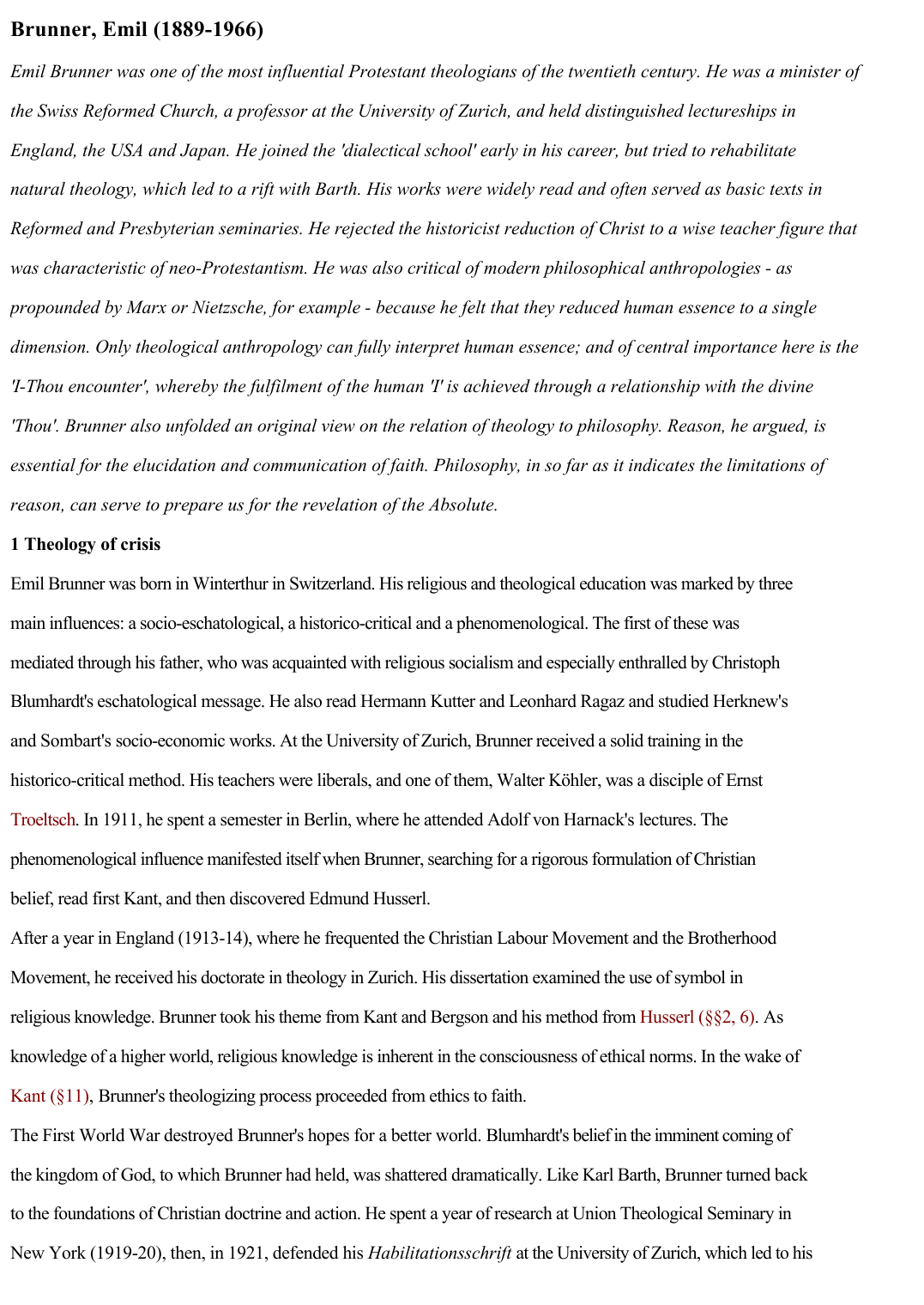Brunner, Emil
Publié le 16/05/2020

Extrait du document
«
Brunner, Emil (1889-1966)
Emil Brunner was one of the most influential Protestant theologians of the twentieth century.
He was a minister of
the Swiss Reformed Church, a professor at the University of Zurich, and held distinguished lectureships in
England, the USA and Japan.
He joined the 'dialectical school' early in his career, but tried to rehabilitate
natural theology, which led to a rift with Barth.
His works were widely read and often served as basic texts in
Reformed and Presbyterian seminaries.
He rejected the historicist reduction of Christ to a wise teacher figure that
was characteristic of neo-Protestantism.
He was also critical of modern philosophical anthropologies - as
propounded by Marx or Nietzsche, for example - because he felt that they reduced human essence to a single
dimension.
Only theological anthropology can fully interpret human essence; and of central importance here is the
'I-Thou encounter' , whereby the fulfilment of the human 'I' is achieved through a relationship with the divine
'Thou' .
Brunner also unfolded an original view on the relation of theology to philosophy.
Reason, he argued, is
essential for the elucidation and communication of faith.
Philosophy, in so far as it indicates the limitations of
reason, can serve to prepare us for the revelation of the Absolute.
1 Theology of crisis
Emil Brunner was born in Winterthur in Switzerland.
His religious and theological education was marked by three
main influences: a socio-eschatological, a historico-critical and a phenomenological.
The first of these was
mediated through his father, who was acquainted with religious socialism and especially enthralled by Christoph
Blumhardt's eschatological message.
He also read Hermann Kutter and Leonhard Ragaz and studied Herknew's
and Sombart's socio-economic works.
At the University of Zurich, Brunner received a solid training in the
historico-critical method.
His teachers were liberals, and one of them, Walter Köhler , was a disciple of Ernst
Troeltsch .
In 1911, he spent a semester in Berlin, where he attended Adolf von Harnack's lectures.
The
phenomenological influence manifested itself when Brunner, searching for a rigorous formulation of Christian
belief, read first Kant, and then discovered Edmund Husserl.
After a year in England (1913-14), where he frequented the Christian Labour Movement and the Brotherhood
Movement, he received his doctorate in theology in Zurich.
His dissertation examined the use of symbol in
religious knowledge.
Brunner took his theme from Kant and Bergson and his method from Husserl (§§2, 6) .
As
knowledge of a higher world, religious knowledge is inherent in the consciousness of ethical norms.
In the wake of
Kant (§11) , Brunner's theologizing process proceeded from ethics to faith.
The First World War destroyed Brunner's hopes for a better world.
Blumhardt's belief in the imminent coming of
the kingdom of God, to which Brunner had held, was shattered dramatically.
Like Karl Barth, Brunner turned back
to the foundations of Christian doctrine and action.
He spent a year of research at Union Theological Seminary in
New York (1919-20), then, in 1921, defended his Habilitationsschrift at the University of Zurich, which led to his.
»
↓↓↓ APERÇU DU DOCUMENT ↓↓↓
Liens utiles
- Ernst-Emil Wiechert
- Emil Nolde1867-1956D'origine paysanne, ébéniste de profession, l'Allemend Emil Hansen (de son vrai nom)enseigne le dessin ornemental de 1892 à 1898 à l'École des arts et métiers de Saint-Gall enSuisse.
- Emil Michel Cioran1911-1995Né à Rasinari, en Roumanie, Cioran était le fils d'un prêtre orthodoxe.
- Ernst-Emil Wiechert1887-1950Son impérieux besoin de simplicité rappelle Rousseau.
- Zâtopek Emil


